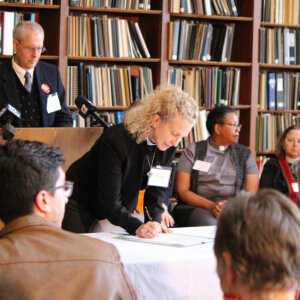The elections of the Rt. Rev. Sean Rowe as the next presiding bishop of the Episcopal Church, and the reelection of Julia Ayala Harris were perhaps the biggest news events emerging from the 81st General Convention, which ended on June 30 in Louisville, but Bishop Nicholas Knisely and the diocese’s deputies say that only begins to cover the good news coming from the convention.
 For Deputy Olive Swinski, the highlight of convention was being able to participate in the Under 40 Caucus, a group of dozens of young deputies that emerged both as a political force and a supportive community. “At times it can be lonely being the youngest person in a room, so it was inspiring and life giving to be in a space with other young people who care about the governance and structure of the Episcopal Church,” she says.
For Deputy Olive Swinski, the highlight of convention was being able to participate in the Under 40 Caucus, a group of dozens of young deputies that emerged both as a political force and a supportive community. “At times it can be lonely being the youngest person in a room, so it was inspiring and life giving to be in a space with other young people who care about the governance and structure of the Episcopal Church,” she says.
For Deputy Scott Avedisian, one of the high points of the 81st General Convention, which ended on June 30 in Louisville, actually began when the convention met in Austin six years ago.
At that meeting, the Episcopal Church boisterously welcomed the Diocese of Cuba back into its ranks. But due to challenges created by the COVID pandemic, the Cuban deputation couldn’t attend the 80th General Convention in Baltimore, so the gathering in Louisville was the first post-reunion opportunity for the Cuban diocese to participate as full members of the convention from start to finish.
Avedisian’s other convention highlights also centered on the theme of coming together, and included the juncture of the Dioceses of Eastern and Western Michigan, which created the Episcopal Diocese of the Great Lakes, and the designation of Navajoland as a missionary diocese.
Those two events, along with the reunion on the Dioceses of Eau Claire, Fond du Lac and Milwaukee into the new Diocese of Wisconsin, were greeted with outpourings of enthusiasm at convention.
Deputy Dante Tavolaro, rector of St. Thomas Church, Greenville, made his mark on convention by proposing a successful amendment to the resolution establishing the group of four cities from which the site of the 2030 General Convention would be chosen. His amendment rose out of a widely shared concern that the safety of LGBTQ+ people, people of color and those who might be pregnant be taken into consideration in choosing a site for the convention.
Tavolaro’s amendment did not alter the existing group of finalists: Kansas City, Missouri; Minneapolis; Pittsburgh; Portland, Oregon; and San Juan, Puerto Rico. But it requires that the church’s Joint Standing Committee on Planning Arrangements and the Office of the General Convention to “take into consideration the legal protections and safeguards for vulnerable members of our community attending General Convention,” and it requires the two bodies to “prayerfully and seriously consider current rates of violence against the LGBTQ+ Community and Communities of Color when selecting potential host sites for General Convention.”
“I’m proud of what our deputation did and how hard they all worked,” Bishop Knisely said.
The convention was surprisingly effective, Knisely said.
“It’s hard to keep track of what’s happening in the rush of the daily schedule, but when I step back and look at all that was accomplished, it’s pretty impressive and right up there with some of the other consequential conventions I’ve attended,” he said.
The “big take-away” though, was not what did happen, but what didn’t, the bishop said.
“We went into the convention with real concerns that the level of conflict between passionate advocates for issues around the election of the officers of convention, around questions of Israel and Palestine, for Prayer Book reform and for fairness in the disciplinary process for clergy was going to derail the conversation in multiple ways. But that didn’t happen,” he said.
“What did happen was thoughtful, careful compromise between people across the church. That, to my mind, is Anglican via media at its very best.”





